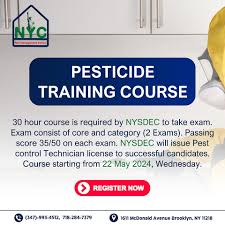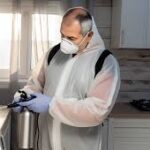Understanding the Importance of Pest Management
Pests can cause significant damage to homes, businesses, and the environment. Whether it is termites eating away at wooden structures, rodents contaminating food, or insects spreading diseases, effective pest control is crucial. To handle these issues professionally, individuals must develop the right skills and knowledge. This requires a strong foundation in pest management principles and proper training.
The Need for Proper Education in Pest Control
Pest management is not just about eliminating unwanted creatures; it is about understanding their behavior, biology, and habitats. Professional exterminators must be equipped with scientific knowledge to ensure safe and efficient removal. Without proper education, one might use ineffective or harmful methods, leading to environmental and health risks.
Different Types of Pests and Their Risks
Common Household Pests
- Rodents – Mice and rats are known carriers of diseases such as hantavirus and leptospirosis. They also cause property damage by chewing on wires and insulation.
- Cockroaches – These pests spread bacteria and trigger allergies, especially in children.
- Termites – They silently destroy wooden structures, leading to costly repairs.
- Bed Bugs – Infestations can be difficult to control, leading to sleep disturbances and discomfort.
- Ants – Some species, like carpenter ants, cause structural damage.
Agricultural and Industrial Pests
- Weevils and Beetles – These insects destroy stored grains and food products.
- Mosquitoes – Apart from being a nuisance, they spread malaria, dengue, and the West Nile virus.
- Flies – Commonly found in food establishments, they contaminate food and spread illnesses.
- Bees and Wasps – Though beneficial to the ecosystem, their presence in unwanted areas can pose safety hazards.
Steps to Becoming a Professional Pest Control Expert
If you are considering a career in pest management, the journey requires dedication and proper instruction. Here’s a step-by-step guide to mastering the field.
1. Obtain the Necessary Education
A high school diploma is typically the minimum requirement for entering the pest control industry. However, enrolling in specialized courses can provide deeper insights into pest behavior, pesticides, and extermination techniques.
2. Enroll in a Certification Program
Several states, including New York, require professionals to be licensed. Certification courses cover topics such as:
- Integrated Pest Management (IPM)
- Pesticide safety
- Laws and regulations
- Environmental impact assessment
3. Gain Hands-On Experience
Training under a seasoned professional is an essential part of the learning process. Many pest control companies offer apprenticeship programs where trainees get to work in real-world scenarios, handling infestations safely and efficiently.
4. Obtain a License
In New York, individuals must pass an exam to obtain a pest control license. The exam tests knowledge of pesticide application, safety procedures, and environmental protection guidelines.
5. Continue Learning and Staying Updated
Pest control techniques evolve as new research and technologies emerge. Attending workshops, seminars, and online courses helps professionals stay ahead in the industry.
Essential Skills for a Successful Pest Control Career
Being an expert in pest management requires more than just knowledge of extermination techniques. Professionals must also possess the following skills:
1. Problem-Solving Abilities
Each infestation presents a unique challenge. Pest control professionals must analyze the situation, identify the root cause, and implement the best solution.
2. Communication Skills
Explaining pest problems and treatment plans to clients in simple terms is crucial. Effective communication builds trust and ensures customers understand the steps being taken.
3. Attention to Detail
Overlooking a single entry point or failing to identify pest eggs can lead to recurring infestations. Thorough inspections and careful planning are necessary to achieve lasting results.
4. Knowledge of Pesticides and Alternative Methods
Understanding different pest control methods, including chemical and non-chemical solutions, is essential. Many clients prefer eco-friendly approaches, so professionals must be well-versed in alternatives such as biological control and habitat modification.
The Role of Technology in Pest Management
Modern pest control relies on advanced technology to improve efficiency and effectiveness. Some of the latest innovations include:
1. Smart Traps and Monitoring Systems
IoT-enabled traps send alerts when pests are detected, allowing for quick action and reducing reliance on chemicals.
2. Thermal Imaging
Heat-sensing cameras help locate pest infestations in hidden areas, such as walls and attics.
3. Drones for Inspections
Drones can inspect hard-to-reach areas in large buildings, farms, and industrial sites, making the process safer and faster.
4. Eco-Friendly Pesticides
Biopesticides derived from natural sources, such as bacteria and plant extracts, provide effective pest control with minimal environmental impact.
Challenges Faced by Pest Control Professionals
Despite the advancements in the industry, professionals still face several challenges:
1. Pesticide Resistance
Some pests develop resistance to commonly used pesticides, making control efforts more difficult.
2. Environmental Concerns
Striking a balance between effective pest control and environmental protection is a continuous challenge.
3. Health Risks
Exposure to chemicals and pest-related diseases poses health risks to workers. Proper safety measures and protective gear are essential.
4. Customer Expectations
Clients often expect immediate results, but effective pest control requires time and follow-up visits to ensure long-term success.
Career Opportunities in Pest Control
A career in pest management offers various opportunities, including:
1. Residential Pest Control Technician
Specializing in home infestations and helping homeowners maintain a pest-free environment.
2. Commercial and Industrial Pest Control Expert
Working with businesses such as restaurants, hotels, and warehouses to ensure compliance with health regulations.
3. Agricultural Pest Specialist
Focusing on pest management in farms and crop protection.
4. Wildlife Control Expert
Handling nuisance wildlife such as raccoons, squirrels, and birds in urban settings.
5. Pest Control Business Owner
Starting a pest management company offers independence and financial growth opportunities.
Future of the Pest Control Industry
The pest control industry is evolving, with increasing demand for sustainable solutions. Trends that are shaping the future include:
- Greater emphasis on Integrated Pest Management (IPM)
- Advancements in biological pest control methods
- Stricter regulations on chemical pesticide use
- Increased use of automation and AI-driven monitoring systems
At the core of the industry’s future is the need for well-trained professionals who can adapt to changing demands and implement innovative solutions.
It is crucial to highlight the significance of pest control training, as it plays a vital role in ensuring that professionals have the knowledge and expertise to handle infestations effectively. Without proper training, the risks associated with pest control increase significantly, affecting both human health and the environment.
Conclusion
Pest management is an essential service that requires expertise, dedication, and continuous learning. Whether you are an aspiring professional or a business owner looking to improve your services, investing in proper education and staying updated with industry trends will lead to success. The demand for skilled pest control professionals continues to grow, making it a rewarding and impactful career choice.



